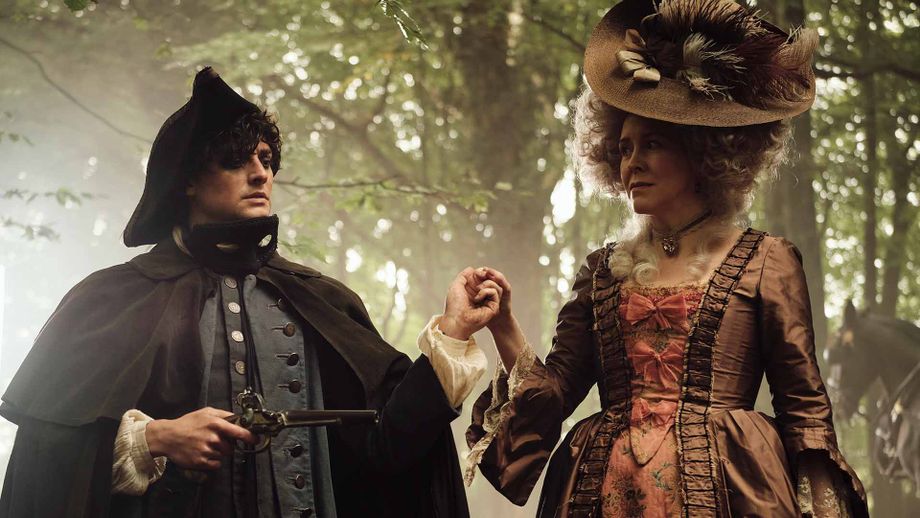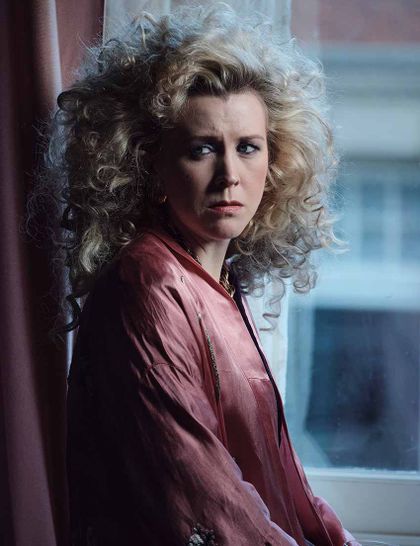By Hugo Emmerzael
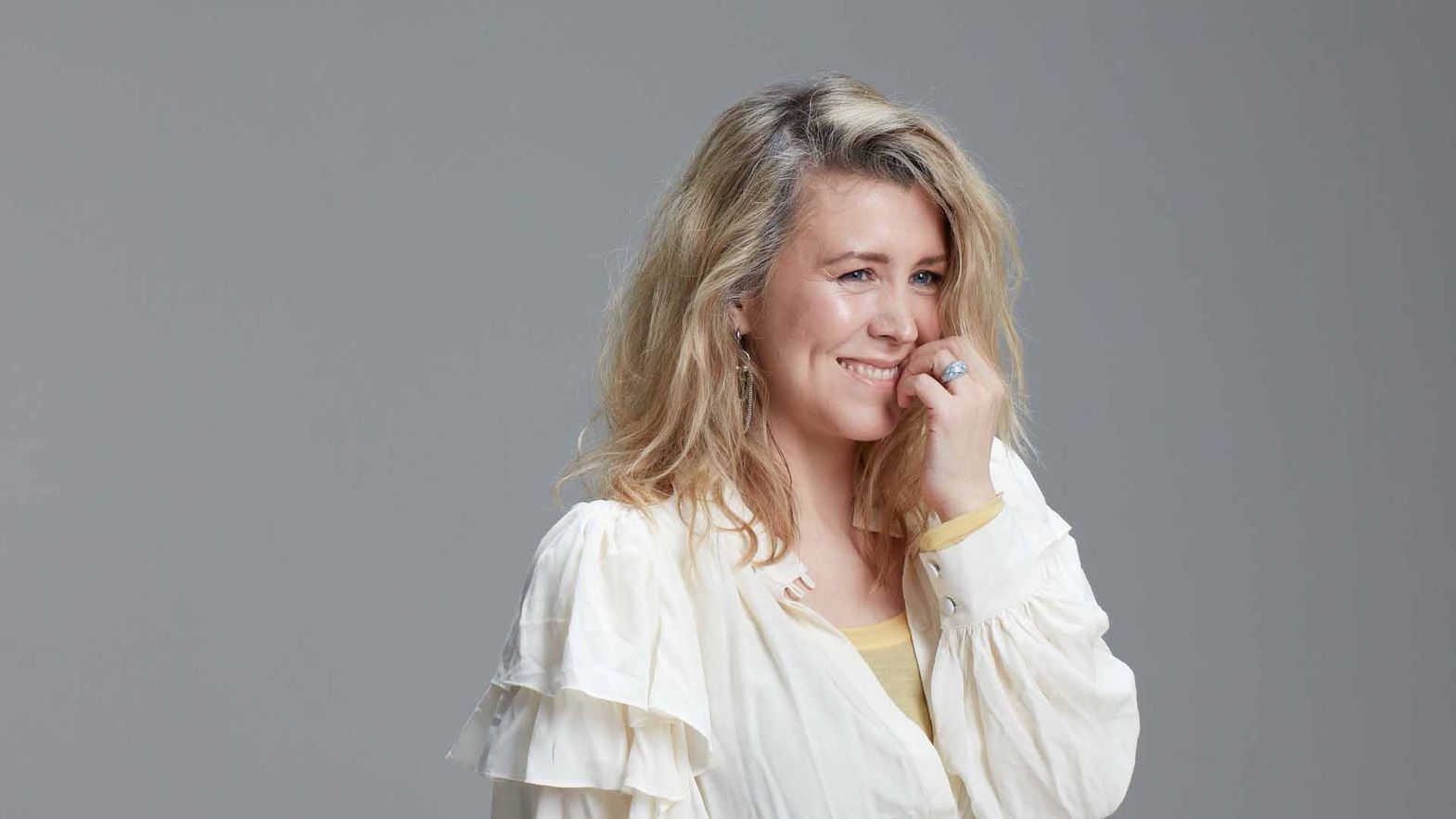 Alice Lowe
Alice Lowe
As the writer, director and star of Timestalker, it’s safe to say that the British multi-hyphenate Alice Lowe is bringing her passion project to Locarno’s Piazza Grande. Her sophomore feature – which follows zany serial killer flick Prevenge (2016), her directorial debut, and a robust acting career as a staple of British comedy, including shows such as Garth Marenghi's Darkplace (2004) – is a cosmic romantic comedy, in which a woman (Lowe) keeps reincarnating, only to fall for the same Mr. Wrong in every new timeline. Timestalker is a hopelessly romantic journey through space and time, exuding Lowe’s genuine and infectious love of fun, spontaneous cinema.
Hugo Emmerzael: You played a serial killer in your debut feature Prevenge, so it’s quite ironic that in this film you’re the one constantly being killed. Was that a conscious decision?
Alice Lowe: I definitely wanted to play with that. I always only realize after the fact that my films are a bit of a reflection of my mental state at that time. In that sense, Prevenge is a much more nihilistic and darker film [than this one], in which I do indeed kill a lot of people. So, this time around, I felt that it would be better, as a writer and for my ego, to keep killing myself, almost as if I deserved it. I guess, on some karmic scale, it was just my turn. Meanwhile, my films are always working on a metaphorical level – and with the hardships that the creative industries have struggled with as of late, especially through COVID, I conceived of this film as a metaphor for keeping this dream of filmmaking and creativity alive. We all know many projects die a certain death at some point, and I think the only thing that keeps you going is this sort of romantic dream. So, the film is very much about that – about keeping going even when it's not a good idea and it turns out to be self-destructive.
All the characters are obviously flawed and screwed up, but you grow to like them in the end.
HE: It feels like Timestalker embodies that creative death drive very strongly. The film has such a huge scope and this incredibly kaleidoscopic, time-bending plot. Did you feel like you had to go all the way with this one?
AL: Absolutely! I simply love making films – I love being on set, love acting and love directing. It’s such a privilege for me to do all that. I was also conscious that I may never get to do all of it again, especially after I had my second baby and the COVID lockdown happened. Obviously, I want to make lots more films, but you never really know, do you? So, this sense of mortality crept in. I'm glad that you mention the scope, as I wanted to be really ambitious and simply put everything in. Like, all the things that excite me about filmmaking are in Timestalker. Not a lot of British films seem to be about fantasy or surrealism anymore, which is a shame, because directors like Powell and Pressburger have a huge influence on me. Their films are so timeless in the way they play with the imagination and reflect on mortality and the human condition. Compared to Prevenge, I also wanted this film to have a more hopeful tone, to have something a bit more redemptive about it. All the characters are obviously flawed and screwed up, but you grow to like them in the end. You have a hope for them that they're going to have a better time in the next life.
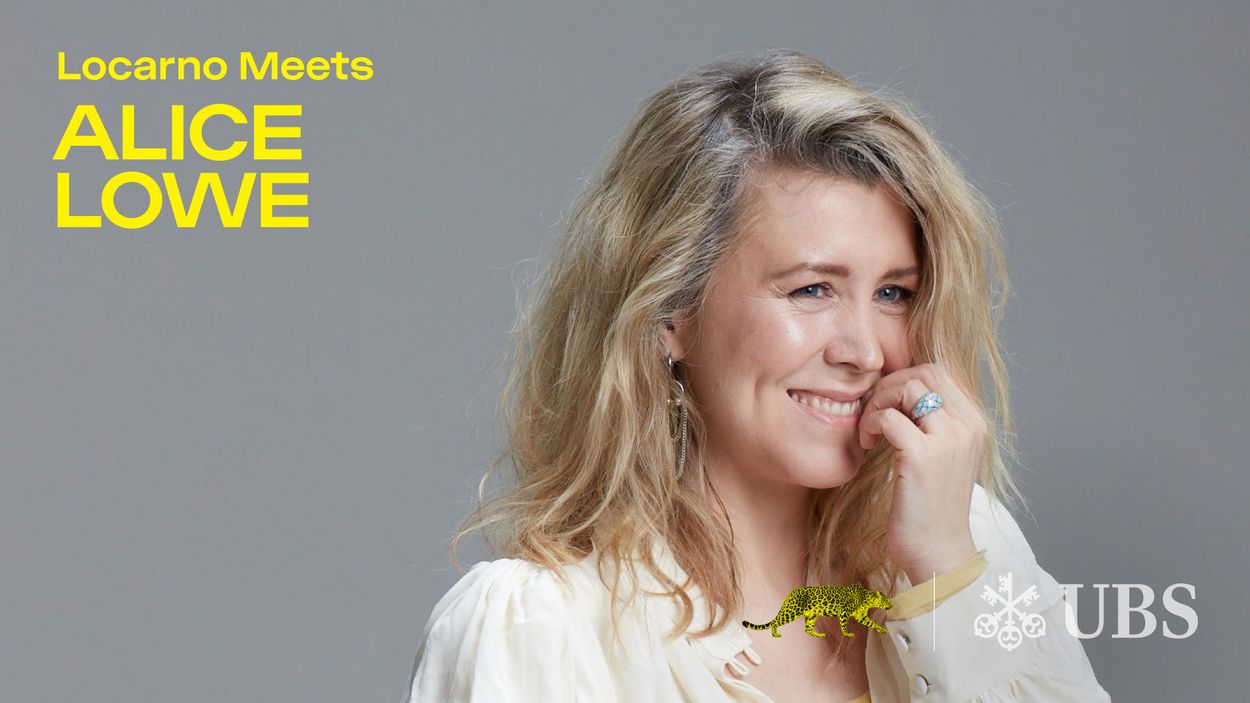
HE: By showing all these reincarnated versions of your own character, Timestalker explores how the position of women in society has shifted throughout history, mostly for the better. And yet, even after all these centuries, you also emphasize that women still aren’t completely liberated and emancipated. How do you see that relationship between progress and also being somewhat stuck in time?
AL: I think there’s always a double bind as a female writer: you want your female characters to escape the constraints of society and also to escape the constraints of narrative. Especially with a romantic comedy, you’re like, how the hell do you do this without succumbing to the same story over and over again? In your fantasies, you want your characters to escape, but the reality is that often the characters aren’t able to do so. Quite often when I’m writing, I’m thinking, “Ah, but this isn't truthful to women's experiences.” More often than not, they feel like they can’t escape, or like they haven’t won. So, without getting to spoiler-y, I’d say the film has a kind of double ending, in which it’s almost like you can choose whether you're a fantasist or a realist. Does she actually escape this time loop and become happy, or does she not?
Something that became a kind of thematic philosophy for us was, “Reincarnation is just the recycling of souls”
HE: These fantastical elements are amplified by the colorful esthetic of the film, which are just so delightfully vibrant and out there. I imagine that the budget was tight, making the visuals even more impressive. How did you pull that off?
AL: When I’m trying to sell a concept, I’m usually across all of it. I’m writing, directing, and starring in the film, so I’m physically there at all times. This means that if we find a location that doesn’t quite conform to the script, I can change the script. And I can even do that on the spot when we’re filming. It makes the film feel intentional at all times, even when we have to compromise or adapt. Something that became a kind of thematic philosophy for us was, “Reincarnation is just the recycling of souls”. We took that to heart. Also, when we were talking with a funding partner like BFI, we pitched that we would reuse everything: locations, actors, extras, costumes. Really, it’s a decision that normally would be a mistake, but because it’s built into the concept of the film, you can get away with it. For me, that’s what I love about filmmaking, this kind of lateral thinking.
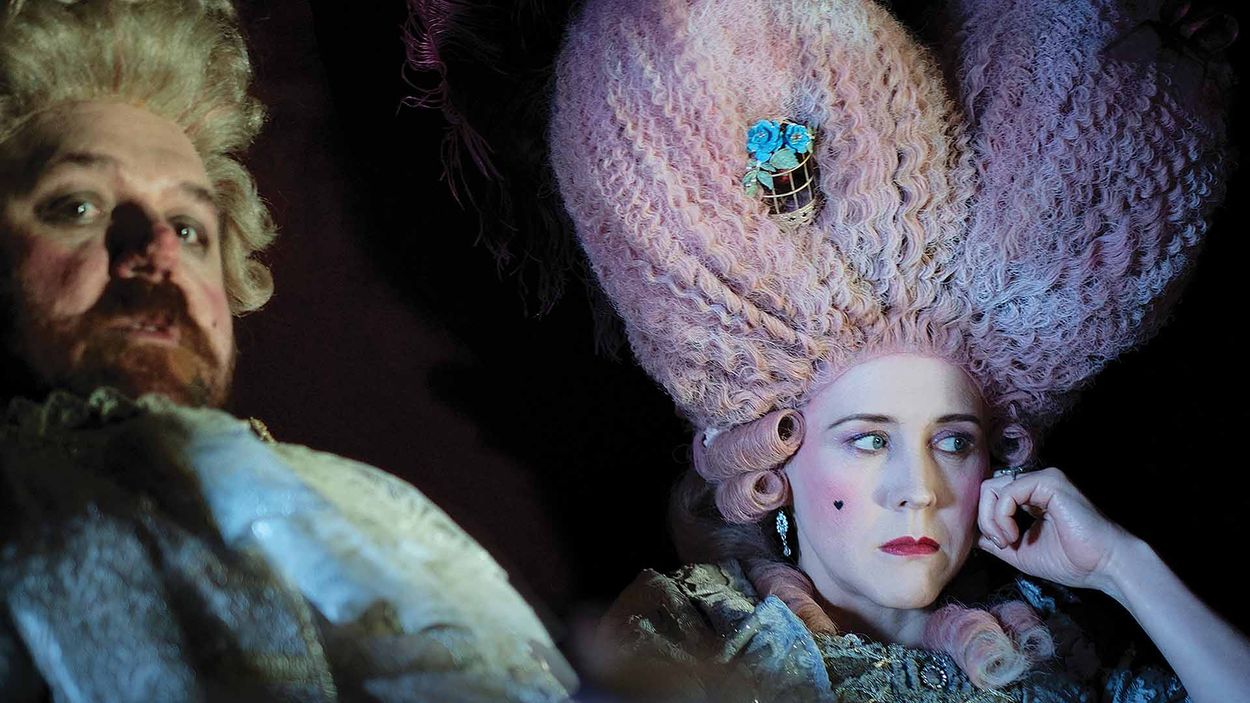 Timestalker ©Timestalker Limited, photograph by Ludovic Robert
Timestalker ©Timestalker Limited, photograph by Ludovic Robert
HE: Even your breakthrough role in the cult comedy series Garth Marenghi's Darkplace (2004) suggests a kind of laissez-faire, everything-is-possible philosophy. So, has this free-spirited form of filmmaking been influenced by your varied acting career?
AL: We used to have such a strong comedy network in the UK, building on that Monty Python tradition. It means that a lot of the creativity that was coming out in the past decades, weirdly enough, came through comedy. It's actually quite interesting that a lot of the peers I worked with in that time have gone into film, because, nowadays, independent film is one of the last few truly creative mediums. I definitely saw that every time I worked as an actor, I would learn something from the director that informed me about how I like to work [as a director?]. For me, it’s mostly about that controlled spontaneity.
HE: Your first short film as a director was Solitudo in 2014. How long before that had you already aspired to direct?
AL: It was a long-gestating thing. I actually started out in theater. Back then I already loved having that sense of complete creative control. I always thought that that was what I wanted to do, and then I accidentally got into comedy, which obviously was much more commercially viable. Television, however, was never really the right fit for me. Then it took me a long time to call myself a writer, even when I was in comedy. It took me even longer to voice the desire of wanting to become a director. I was afraid that I would come across as arrogant when I would say that I wanted to be in control. Especially for a woman in that era, it felt sort of frowned upon. But at some point, I got asked by Jamie Adams to work on this feature film called Black Mountain Poets (2015) which was conceived as an improvisational film and basically made in three days. In a way it was a process that really annoyed me, but it did make me realize I’m quite good at this film thing – that, in fact, I could do this. I also found out that I really loved it! Now people often ask me, “How do you direct and act at the same time? Isn’t that really difficult?” And I'm like, “No! I love it!” I'm finally creating a lovely environment for the actors where they feel free and happy as well, which is still rare.
I think if you get that emotional sincerity right, you can do whatever you want with your films.
HE: You really sense that spontaneity in the film. As the director and star, how do you work with your other actors on set?
AL: It's all just a very human process, I suppose, about finding the emotional truth of everything. If an actor comes on set and they're nervous, I always say, “Well, use those nerves. Just show the reality, do not try to hide it.” I think if you get that emotional sincerity right, you can do whatever you want with your films. It can be about goblins, it can be completely surreal, but as long as people have that human connection to latch onto, they'll forgive you for anything.
HE: A big part of what makes this film sing is the expressive score, which really enhances the kaleidoscopic visuals. What were you looking for in the interplay between music and imagery?
AL: The composers, Toydrum, also did Prevenge and Solitudo, so I've got a long working relationship with them. We developed this film for years, so it was very joyous to be able to have a conversation over a long period of time about what the music should be. I knew that the music would be a character in its own right. It’s part of the narrative and has a personality of its own. It's also not conforming to any genre; it's telling a separate story. We got really excited about the idea of having a motif in the score, which is frankly not very fashionable anymore – but we wanted an actual tune that's recognizable, that reoccurs throughout the whole film, and that reminds you that you're watching the same story and that you're having the same emotions, even though you're constantly in a different world. In that way it tied everything together, and that was really one of the most challenging aspects of the film. The film is about reincarnation, so we tried to capture that uncanny feeling of constantly going, “Oh, I feel like I know this song.”
HE: It feels like you’re trying to keep some sort of magic alive in your film.
AL: I hope so! I just want to make films that feel like a treat – that, when you see the trailer of Timestalker, it feels like eating sweets or something. I feel like not enough independent films have that ambition. Sometimes there’s the idea that you’re maybe not supposed to enjoy all of this film stuff. Timestalker is a clever film, and it wants to be artistic and challenging with its themes, but you’re also allowed to just enjoy it. That’s what I got out of a lot of films that I used to watch when I was younger. I’d be so excited to see a Hammer horror film on the television after 11 p.m. and just knowing that it was going to be fun. With Timestalker, I really had to ask myself, “Am I allowed to do this?” – because in the UK, certainly with female filmmakers, I feel like there are many constraints that we’re not allowed to go outside of – almost like you're not allowed to be more commercial, in a way.
What if I want to be Steven Spielberg and make the next E.T.?
HE: So, you feel the danger of being typecast as a female director?
AL: Yes, exactly. It’s almost as if people tell you, “Why don’t you make another really serious film?” But the thing is, what if I don’t want to do that? What if I want to be Steven Spielberg and make the next E.T.? The question that lies underneath it is actually: are we allowed to have fun? That’s a bigger question with art in general, as we’re in this new era where so many factors are endangering independent art and creativity. Are we still allowed to enjoy our jobs? Or are we supposed to hate them? I, however, intend to have fun doing this, and I want to enjoy it for as long as I can.
